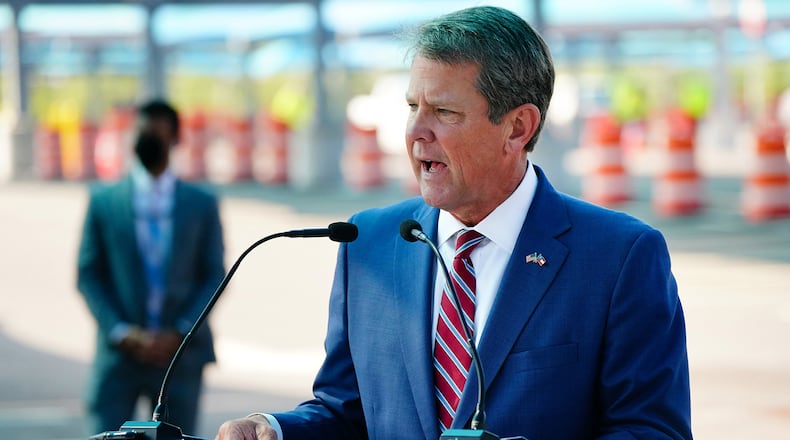Gov. Brian Kemp on Wednesday officially ended the 15-month state of emergency that gave him far-reaching authority to respond to the coronavirus pandemic as the state’s fight against the disease improves.
The governor signed an executive order that lifts the state’s declaration of a public health emergency while also keeping many key elements in place, such as looser restrictions on medical licensing and more flexibility to distribute federal aid.
“With coronavirus cases, hospitalizations and deaths at all-time lows — and vaccinations on the rise — Georgians are getting back to normal,” he said, adding: “Now, we must commit to working together to ensure Georgia’s best and brightest days are ahead.”
The emergency orders, ratified by lawmakers in March 2020, gave his administration the ability to suspend state laws, take “direct” control of civil staffers, commandeer property, close schools, restrict travel and limit public gatherings.
While many of the authorities weren’t used, the vote empowered Kemp to take steps both big and small to target the pandemic and influence how millions of Georgians lived their lives.
His administration relaxed rules on licensing medical professionals, eased weight limits on trucks, imposed restrictions on businesses, let vaccinations be administered in unorthodox settings and paved the way for increased federal aid for needy families.
During the pandemic, the federal government increased food aid for some families through the Supplemental Nutrition Assistance Program, the program formerly known as food stamps. As many as 750,000 Georgian SNAP recipients benefited, with an extra allotment of $100 per month or more for a family of four.
But states must have their own emergency declarations in place to qualify for the extra food assistance. Tom Rawlings, director of Georgia’s Division of Family and Children Services, said he believes the language in the replacement order is strong enough to trigger continuing use of federal emergency benefits in the state.
“While this order recognizes that we have come far, it also allows us to continue with the economic benefits that some Georgians are going to continue to need as the economy recovers from the effects of COVID,” Rawlings said.
When Kemp adopted the public health emergency last year, it was the first time in state history a governor had issued such a declaration.
Kemp said it was essential to have “all available resources” available to respond to an outbreak that was menacing the country, and lawmakers, even those skeptical of granting the governor new powers, agreed to ratify the decision.
The number of COVID-19 infections, hospitalizations and deaths in Georgia are at the lowest levels since the earliest days of the pandemic, according to an Atlanta Journal-Constitution analysis of state figures.
About 53% of Georgia adults have received at least one dose of vaccine, compared with the national average of 66%, according to U.S. Centers for Disease Control and Prevention data. For eligible Georgians, those 12 and older, about 51% have received at least a single shot, compared with 64% nationally.
State Democrats said voters should thank President Joe Biden and his administration -- rather than Kemp and the GOP -- for steps including the $1.9 trillion coronavirus relief package and efforts to speed the distribution of the vaccine.
“Georgia voters will remember that while Brian Kemp and Republicans put politics before our health and safety at every turn, it was President Biden and Democrats who got the pandemic under control and put our country and our state back on track,” said Scott Hogan, the state Democratic party’s executive director.
A growing number of governors have relaxed emergency powers as the number of cases subsides. But public health experts warn the pandemic still remains prevalent and they worry that a new strain of the disease, known as the delta variant, could pose new threats.
Some lawmakers say they never again want to see a Georgia governor with such unbridled authority.
Some Democrats are concerned about future leaders using the power to limit responses, as Kemp did last year in trying to block local mask mandates. A number of Republicans have expressed concern about overreach in future crises.
“We will definitely address it,” said state Rep. Kasey Carpenter, a Dalton Republican who sponsored legislation this year to curtail the scope of the emergency powers.
“Gov. Kemp did an outstanding job handling the pandemic,” Carpenter said. “However, looking around at other states, we saw many who exploited this power.”
The Latest
Featured




